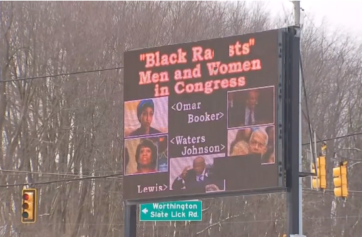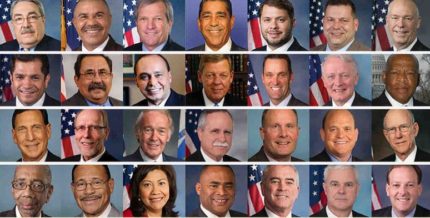
Maine Gov. Paul LePage
It looks like the governor of Maine is looking to outdo President-elect Donald Trump when it comes to publicly smearing Georgia congressman and civil rights icon John Lewis.
During his weekly radio interview with local station WVOM, Maine Gov. Paul LePage asserted that Lewis should be thanking white, Republican politicians instead of protesting them.
Lepage’s sharp remarks were sparked by the decision of more than 40 House Democrats to boycott the inauguration of President-elect Trump this week after the former reality TV star dubbed Lewis an “all talk” figurehead who needed to focus on cleaning up his “crime infested” district in Atlanta. The president-elect’s attack on Lewis came after the civil rights activist asserted that Trump wasn’t a “legitimate president” due to intelligence reports that Russian hackers influenced the outcome of the 2016 election.
“How ’bout John Lewis last week criticizing the president?” LePage said in his interview. “I will just say this. John Lewis oughta look at history. It was Abraham Lincoln that freed the slaves. It was Rutherford B. Hayes and Ulysses S. Grant that fought against Jim Crow laws.”
“A simple thank you would suffice,” he added.
The governor went on to complain that “the Blacks” unfairly painted all white Americans as racists, and therefore, should apologize to the white people who fought and died in the Civil War for their freedom.
“The NAACP should apologize to the white people, to the people from the North for fighting their battle,” LePage said.
The broad claim that formerly enslaved African-Americans were granted their freedom by white Republicans like Lincoln, Hayes and Grant has become an all-too-common rebuttal among right-wing politicians looking to circumvent accusations of racism. But their claim ultimately falls flat, as it overlooks the pivotal 1960s-era shift that redefined what it meant to be a “Democrat” or a “Republican,” according to ThinkProgress.
The news site pointed out that the Democratic party, once supported by white supremacists and segregationists in the South, was all but abandoned for the GOP after Democrats passed the Civil Rights Act and the Voting Rights Act. Following this realignment of party identities, Republicans implemented a number of electoral strategies that upheld a racist voting block Democrats formerly dubbed the “solid South.”
LePage named three Republican presidents from before the crucial civil rights era transition, creating a gaping hole in his argument. Not to mention, it’s common knowledge among Black Americans that Lincoln wasn’t the “great emancipator” history books portrayed him to be.
The Root reported that while Lincoln did issue the Emancipation Proclamation, the executive order technically didn’t outlaw slavery in the U.S. It, instead, only freed enslaved Blacks in the Confederate states, and didn’t apply to those still enslaved in Union states.
As for Hayes, ThinkProgress explained that the former U.S. president basically facilitated the obstruction of Black economic and political progress across the South after the Civil War.
“He removed the former Confederacy from the strict federal oversight that had helped foster Black economic and political gains, restoring local control that white landowners and former slaveholders quickly used to break up working-class coalitions of Black and white voters and gin up the very segregationist policies that Lewis and other civil rights leaders physically defied two generations later,” the news site stated.
Grant, a former Civil War general, might have been the only one of the three presidents LePage named who protected the rights of freed Black Americans. For instance, he ensured freedmen’s right to vote through ratification of the 15th Amendment in February of 1870, according to History.com.
Less than a century later, Lewis would march alongside Dr. Martin Luther King Jr. in the fight to end racial segregation, enduring multiple arrests and brutal beatings along the way. His lifelong commitment to activism and public service has gained him the respect of both liberals and conservatives.
When asked if he would issue a response to LePage’s remarks, a spokesperson from Lewis’ office said the governor’s statement didn’t warrant one.
“I don’t think [Lewis] feels the need to defend himself against spurious comments,” Lewis’ communications director, Brenda Jones, said. “People who know America’s history know what the facts are. It sounds to me like [LePage] is just trying to be mean-spirited. The facts of history refute that statement.”


